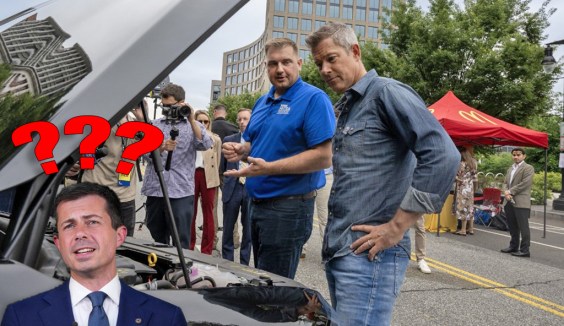Today on the Network, a celebration of the growth of car-sharing, some thoughts on overcoming crazy anti-transit rhetoric and an innovative strategy for encouraging bike commuting.
The Perfect Simplicity of Zipcar: In honor of its initial public offering, Rob Pitingolo at Network blog Extraordinary Observations pays tribute to Zipcar. The growing car-sharing service is not a substitute for transit, he says. In fact, without a variety of transportation options, the Zipcar model just doesn't work very well. Zipcars tend to live near transit stations. That's why, Pitingolo says, you don't see the service expanding in cities like Dallas and Houston. "Zipcar isn't just a business, it's a tool of urbanism. It provides neighborhoods a tremendous social good. And the fact that it's provided by a for-profit company on the verge of profitability is definitely something to note."
The Bogus "Social Experiment" Argument: Here's the type of thing you might say if you oppose a transit investment: blah, blah, blah SOCIAL EXPERIMENT! This was the position, in a nutshell, of a recent editorial in the Seattle Times, regarding the controversy over the Alaskan Viaduct tear down and the construction of a deep-bore tunnel for vehicle traffic. "It's about a social experiment: The idea is to force gridlock so more people take public transit or ride bicycles," said columnist Jordan Royer. But as Frank at Network blog Orphan Road points out, that grossly hyperbolic position makes approximately zero sense. "In truth, all transportation is social engineering. If we build more highways, we’ll be manipulating society as well, just in the way that they prefer." That's a social experiment that we've tried and it's not working very well. What kind of society will we become if we don't try to improve on our system, with all its flaws and inefficiencies?

Paying Employees to Bike Commute: Here's a winning strategy for encouraging employees to bike to work: pay them. Bike Portland is reporting that Oregon Health and Science University has been doing just that -- with impressive results. The university has paid about about $183,000 in incentives and about 10 percent of its employees cycle to work. Bike Portland's Jonathan Maus explains the program: "For every 30 bike trips logged, participants can choose from one of three incentives; either a reimbursement of one month's worth of car parking (if they also drive), $35 if they also get a transit pass subsidy, or if they bike and do not partake in the transit or car parking programs, participants receive $50." It would be interesting to see how that $183,000 compares to savings on parking lot maintenance and health care costs. Even without additional data, I'd bet that this is a fairly inexpensive and effective employee wellness program.






